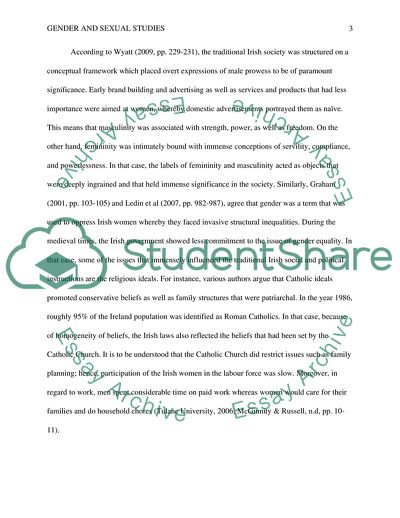Cite this document
(Does Gender have an Influence on the Lives of People in Irish Society Essay Example | Topics and Well Written Essays - 1500 words, n.d.)
Does Gender have an Influence on the Lives of People in Irish Society Essay Example | Topics and Well Written Essays - 1500 words. https://studentshare.org/gender-sexual-studies/1806942-gender-has-little-or-no-influence-on-the-lives-of-people-in-irish-society-a-critical-appraisal
Does Gender have an Influence on the Lives of People in Irish Society Essay Example | Topics and Well Written Essays - 1500 words. https://studentshare.org/gender-sexual-studies/1806942-gender-has-little-or-no-influence-on-the-lives-of-people-in-irish-society-a-critical-appraisal
(Does Gender Have an Influence on the Lives of People in Irish Society Essay Example | Topics and Well Written Essays - 1500 Words)
Does Gender Have an Influence on the Lives of People in Irish Society Essay Example | Topics and Well Written Essays - 1500 Words. https://studentshare.org/gender-sexual-studies/1806942-gender-has-little-or-no-influence-on-the-lives-of-people-in-irish-society-a-critical-appraisal.
Does Gender Have an Influence on the Lives of People in Irish Society Essay Example | Topics and Well Written Essays - 1500 Words. https://studentshare.org/gender-sexual-studies/1806942-gender-has-little-or-no-influence-on-the-lives-of-people-in-irish-society-a-critical-appraisal.
“Does Gender Have an Influence on the Lives of People in Irish Society Essay Example | Topics and Well Written Essays - 1500 Words”. https://studentshare.org/gender-sexual-studies/1806942-gender-has-little-or-no-influence-on-the-lives-of-people-in-irish-society-a-critical-appraisal.


